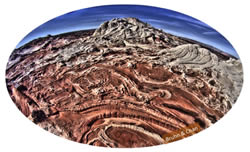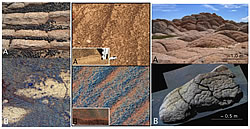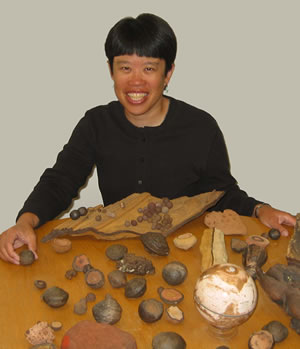2014 GSA Distinguished International Lecturer

Marjorie A. Chan
• Read Chan's Bio
• Lecture Tour Schedule
Lecture Topics
View lecture (recorded in Tokyo on 9 May 2014).
Eolian Explorations: Dunes, Deformation, and Diagenesis
 click for larger image
click for larger image
Eolian (wind-blown) sand dune systems are globally important reservoir units for both hydrocarbons and water. These systems contain complex geologic stories and paleoenvironmental records with applications to understanding reservoir properties and fluid migration pathways. This talk uses well-exposed Permian to Jurassic examples to addresses three groups of questions.
- DIAGENESIS: Why are sandstones different colors (reflected in bleaching and iron oxide cements), and what does this tell us about reservoir properties and diagenetic history? When did it happen and is it useful as an exploration tool? Is diagenesis a biogenic process? What links dinosaur bones and concretions (cemented mineral masses)?
- SOFT-SEDIMENT DEFORMATION: What kind of deformation happens in eolian systems and why are they susceptible? What structures give us clues to deciphering the records of strong ground motion?
- WEATHERING: Why do particular weathering patterns develop on exposed sandstone surfaces and what do they tell us about microclimate?
 Click to enlarge.
Click to enlarge. Mars images: NASA/JPL-Cornell
Finally, this summary introduces new directions of eolian research, and the implications of biological and environmental interactions.
Mars for Earthlings: Using Earth Analogs to Decode the Sedimentary History of Mars
Mars has held our interest since ancient times, but now we have the ability to scientifically explore the Red Planet at unprecedented scales. Studies of sedimentary environments on Earth are critical to helping us interpret extraterrestrial sedimentary and diagenetic processes, as well as where habitable environments might exist. This talk explores Earth analog comparisons to Mars that include: red rocks and concretions (“blueberries”) and the implications for past fluid flow, similarities of cross bedded sandstone, comparisons of shoreline geometries, and weathering phenomena.
top
Biography
Dr. Marjorie A. Chan is GSA’s 2014 Distinguished International Lecturer and is a Professor of Geology at the University of Utah in Salt Lake City, Utah. She received a B.S. in Geology from the University of California – Davis in 1977 and a Ph.D. in Geology from the University of Wisconsin – Madison in 1982. Her research topics have spanned the geologic time scale from the Precambrian to the Pleistocene. Her recent projects connect geology and planetary science to better understand and interpret the red planet Mars. She has authored or co-authored more than 100 peer-reviewed professional articles on a wide range of sedimentary topics involving clastic depositional environments, sedimentology, fluid flow/diagenesis (e.g., iron oxide sandstone coloration and concretions), Earth analogs to Martian environments, and geoconservation.

Dr. Chan is sought out as a speaker, has given many invited lectures, and is on the Association of Women Geoscientists speaker bureau list. She received two national meeting excellence of presentation awards from SEPM (Society for Sedimentary Geology). She and her research have been featured in several television documentaries including National Geographic and Discovery Channel shows, as well as various videos. She was a 2013 guest on the National Public Radio – Talk of the Nation, Science Friday show. Dr. Chan is experienced in giving public lectures to a variety of audiences of all ages and makes science interesting and accessible.
She is an elected GSA Fellow (1995) and has been actively involved in GSA activities with recent leadership roles as chair of the GSA Diversity Committee (2012-2013) and First Vice/Incoming Chair for the GSA Sedimentary Geology Division (2012- 2014), in addition to convening workshops and many technical meeting sessions. She was recognized as a GSA Bulletin Exceptional Reviewer (2011) and her biography is in the book: A to Z of Earth Scientists, Notable Scientists: Facts on File, Inc. (2002). Dr. Chan has received department research and teaching recognition at her university as well as honors including a 2009 YWCA Outstanding Leadership Award, and the 2010 University of Wisconsin-Department of Geosciences Distinguished Alumnus. She has served as a science advisor for PBS-Nova Science Now. She has provided leadership counsel for academic department chairs and administrators at both GSA and AGU (American Geophysical Union) meetings. As department chair, Dr. Chan helped create innovative geologic displays for a new geoscience building that encourages an experiential learning environment. She has given invited national presentations on the design of campus buildings as educational environments.
Dr. Chan has been a strong advocate and role model for women in science for the last three decades. She is active in encouraging women and minorities in science disciplines. She is excited to represent GSA in a new age of science that will be dependent o n sustainable practices, global cooperation, and engaged students who will help lead our future.